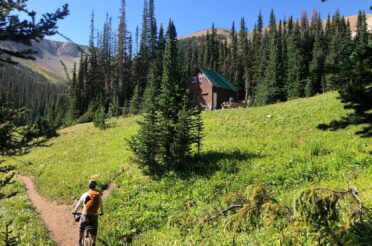The Lifestyle at the Ranch - a graduated process

Maslows hierarchy of needs is a model for understanding the motivations for human behavior. The different levels can be met in the lifestyle on the ranch.
You just arrived at the Ranch. You left your home only a couple of days ago. Your home provided you shelter, water and warmth. You felt safe in your home; felt loved by friends and family, appreciated and respected. According to Maslows Hierarchy all your deficit needs were satisfied., meaning you were not lacking anything. However, you had a desire to grow, you were not deprived of anything that you needed for your survival and still you felt disconnected and restless. This motivated you to change your environment. You came to the Ranch, an environment where you can actualize what you are capable of and pursue your creativity and talent.
But coming to the Ranch meant you changed your environment. Let me explain what that means:
We live out in the remote wilderness that means we are more affected by our lower level of needs than in a city environment.. We go through Maslows hierarchy from bottom to top every day and fluctuate constantly between the levels because we get more easily disrupted by a deficit in our lower level needs. For example, lack of fire wood means no warmth, not adjusting our water intake means no water, affected by extreme temperatures and sharing the land with wild animals such as bears and cougars diminishes our safety level and we need to take more precautions. Also, being far away from medical support affects us. If our lower level needs are not satisfied, we are working in a survival mode meaning all other needs become secondary. According to Maslow, all our behavior is motivated to satisfy the lowest need, even when we are unconscious of it or neglect it at first.
Once we have taken care of our survival and assured extra safety precautions, in comparison to living in the city, our needs change. As Maslow mentioned, when those levels are satisfied the human being strives for more belonging and their place in a group. Entering a new environment means you are still learning. You are driven by your need to contribute, but still looking for a way to do so. You might be washing dishes or cleaning for the first couple days. Those things are easy to take initiative for. But as everything is a graduated process. To find what you are good at and invest in yourself and interest you will need to get an understanding of how things work here and what opportunities align with your interest. So while you go through that process, you do more simple things in order to find belonging and your place in the group.
While you go through that process, you develop, learn, evolve and grow. You will understand how things work. You will get motivated by your self-esteem and want to gain achievements, confidence, independence. For example, you want to shoe a horse , you want to complete the booking of a guest or fix that truck. As soon as you learn to align those motivators with your interests, you will actualize what you are capable of and move into the level of self-actualization. So for example, you want to guide the Pack Trip, because it gives you the opportunity to educate guest about the virtues of the Chilcotin Ark and to ride beautiful mountain tops. Every challenge along the trip will appear solvable to you, you become creative in how to make things work, and you have a positive attitude.
However, though fluctuating from top to bottom on a daily basis might seem frightening, it shows change is possible. You can assess yourself where you are at and how you move up or avoid moving down. One day you might be only trying to survive, but the next day you are working on what fulfills you and actualize yourself- Everything is possible.



